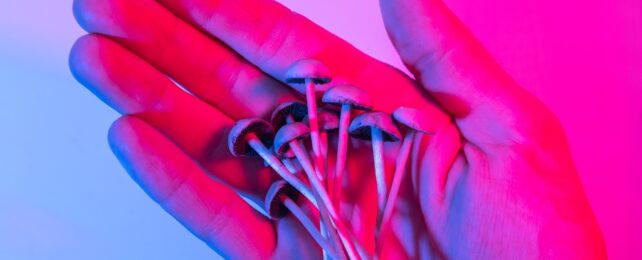Calls to poison control centers spiked across the U.S. for adolescents and young adults exposed to the hallucinogen psilocybin, according to our analysis of data from 55 U.S. poison centers between 2013 and 2022.
The calls increased after 2019 when psilocybin was decriminalized and legalized in several cities and states.
Psilocybin is a compound found in "magic mushrooms," a popular recreational drug that was decriminalized for the first time by Denver, Colorado, in 2019.
Decriminalizing doesn't mean psilocybin is legal, but it directs the police to focus on other crimes. Denver also was the first city to legalize small amounts of marijuana in 2005 and continues to push for changing drug policy.
Magic mushrooms are legal to purchase, possess and even cultivate in just two states: Oregon, which legalized psilocybin in 2020, and Colorado, which followed in 2022.
We are an emergency medicine physician and epidemiologist. Part of our job is to track public health risks related to poisons and to create efforts to prevent them. We are both concerned about the increase in calls to poison control centers related to psilocybin.
Why it matters
When someone ingests magic mushrooms, psilocybin gives them a psychedelic experience, causing euphoria and alterations in how they perceive space and time.
Using psilocybin can also cause psychosis, hallucinations, delusions and agitation. In the U.S., psilocybin is designated as a Schedule 1 substance under the Controlled Substances Act, meaning it has no accepted medical use and has a high potential for abuse.
Our study demonstrates a steady increase in psilocybin exposures in adolescents beginning in 2019. Some of these young people experienced serious health effects.
This increase in calls happened just as Denver voters passed a ballot measure to become the first city to decriminalize in May 2019.
Since then, several other cities, including Detroit, Washington, D.C., and Seattle, have also decriminalized psilocybin. Other cities and states have legislation pending.
The poison center data we used in our study isn't broken down by state, so it is impossible to know exactly where the calls were coming from – and whether they were in cities that have decriminalized or states that have legalized magic mushrooms.
What our research found
During the 10-year period in our study, the National Poison Data System logged 4,055 psilocybin-involved exposures among young people ages 13 to 25.
Between 2013 and 2018, before decriminalization in Denver, the number of psilocybin-related cases did not change significantly among any age group. A considerable yearly increase in cases among 13- to 18-year-olds began in 2019 at the same time as the first decriminalization, and among 19- to 25-year-olds starting in 2020.
Just two years later, psilocybin cases reported to U.S. poison centers more than tripled among adolescents and more than doubled among young adults, compared with 2018 when the drug was uniformly illegal.
Most of the reported cases – 75.3% for adolescents and 72.1% for young adults – required medical attention, including admissions to a hospital or psychiatric facility. The most common effects among these exposures included hallucinations, delusions, agitation, rapid heart rate and confusion.
What other research is being done
Our findings correspond with a review of more than 30 studies that demonstrates a similar rise in acute cannabis poisoning among children and adolescents beginning after marijuana was legalized in 1996.
We find this particularly alarming, since the states that legalized and cities that decriminalized psilocybin don't allow anyone under 21 to use it or buy it. This suggests young people are getting it illegally.
The Research Brief is a short take on interesting academic work.![]()
Christopher P. Holstege, Professor of Emergency Medicine and Pediatrics, University of Virginia and Rita Farah, Researcher of Epidemiology, University of Virginia
This article is republished from The Conversation under a Creative Commons license. Read the original article.
